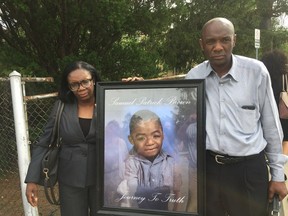Samuel Brown Inquest: Day six

Article content
Nurses, personal support workers and educational assistants working with students with intellectual and developmental disabilities should receive mandatory training to identify aspiration pneumonia, a coroner’s jury was told Tuesday.
Heidi Janz said the early signs of aspiration are often subtle, can sometime subside but can become quite serious very quickly. Janz testified at the coroner’s inquest into the death of Samuel Brown.
An 18-year-old deaf/blind student at W. Ross Macdonald School, Samuel was declared deceased Feb. 9, 2018 after being rushed to Brantford General Hospital from the provincially-run school.
Samuel died of pneumonia and the inquest, which began Aug. 28, has heard that he had trouble swallowing and, as a result was vulnerable to aspiration and pneumonia. Aspiration is the collection of food, liquids or other substances in the lungs which can lead to pneumonia.
A student at W. Ross Macdonald since he was four-years of age, Samuel stayed a South View Lodge at the school during the week and returned to his Brampton home on weekends during the school year.
Jurors heard how overnight staff found Samuel unresponsive when they tried to wake him at 6 a..m. Feb. 9 to change his diaper. Efforts to rouse him were unsuccessful and 911 was called.
Efforts by both Brantford firefighters and Brant-Brantford paramedic’s to save Samuel were unsuccessful.
A professor who specializes in disability ethics, Janz has expertise in ableism – discrimination in favor of those who are able-bodied and against those who have a disability. Janz is an assistant adjunct professor with the John Dossetor Health Ethics Centre.
Although Janz has a basic understanding of Samuel’s death and some of the facts leading up to his passing, she has not followed the testimony provided at the inquest which began Aug. 28. Janz acknowledged that she couldn’t comment on the actions of the nurses and caregivers who were on duty on Feb. 8 and 9th and who have already testified at the inquest.
During her testimony, Janz acknowledged that she is not a medical doctor.
But as someone who lives with cerebral palsy, Janz, speaking from lived experience, said the early symptoms of aspiration pneumonia are so subtle that they can be missed. The early symptoms include increased congestion, lethargy and a low grade fever.
Janz also recommended that all schools (classrooms) with for students with intellectual and developmental disabilities should develop and enforce protocols for ongoing monitoring and documenting of changes in the behavior of students and medical symptoms.
Medical examiners and coroners should receive training on medical ableism and diagnostic overshadowing and the harm they can cause, Janz said.
Post-mortem diagnostic overshadowing happens when a person’s pre-existing disability – cerebral palsy – is reported as the underlying cause of death. That could obscure the actual disease or injury that started the process leading to the disabled person’s death, Janz said.
The coroner’s jury also heard from Dr. David Chiasson, a pathologist at the Hospital for Sick Children in Toronto, who performed the autopsy on Samuel.
Samuel’s cause of death was acute bronchopneumonia, he told the inquest on Tuesday.
Chiasson described this as bacterial infection of the lung, where air spaces become filled with inflammatory cells.
Maria Stevens, the inquest’s counsel, asked Chiasson about the time frame for which pneumonia would develop.
“It does take a number of hours for the inflammatory cells to start filling up the lung and it was quite extensive pneumonia,” he said.
“I can’t be specific as to how long the pneumonia was there for, but it was certainly there for, I would say, at least a day, at least at the beginning,” he said. “It’s worsening over time but at least a day, possibly two.”
Stevens also asked Chiasson about the symptoms of pneumonia.
He explained as a pathologist he doesn’t treat living patients, but based on his general medical knowledge common symptoms are cough, fever and difficulty breathing. In some cases people suffer from fatigue, malaise and not feeling well.
“In general, people with pneumonia severe enough to result in death are unwell in some way, shape or form,” he said.
The inquest has heard previously that Samuel had trouble swallowing and, as a result was vulnerable to both aspiration and pneumonia. Aspiration is the collection of food, liquids or other substances in the lungs which can lead to pneumonia.
Chiasson was asked about aspiration being a factor.
He said he didn’t see specific evidence of aspiration, but it could have been a triggering factor.
“It’s a common reason to develop pneumonia,” he said.
The inquest is scheduled to resume Wednesday.
Vball@postmedia.com
twitter.com/EXPVBall
Postmedia is committed to maintaining a lively but civil forum for discussion. Please keep comments relevant and respectful. Comments may take up to an hour to appear on the site. You will receive an email if there is a reply to your comment, an update to a thread you follow or if a user you follow comments. Visit our Community Guidelines for more information.